MIXED – Suomalaista elämää kulttuurien risteymässä: a bilingual book review from three perspectives!22/3/2023 MIXED – Suomalaista elämää kulttuurien risteymässä Millaista on nykypäivän suomalaisuus? Kattava tietokirja taltioi mixed-suomalaisten kokemuksia ja esittelee antirasismin periaatteita. This book is a contemporary picture of Finnishness. The interviews and stories take us close to the experiences of mixed Finns. For us in Familia, this book encompasses broadly the challenges and opportunities for intercultural youth and intercultural families in Finland. The book is also an information package about concepts such as racism and discrimination. Meet the perspectives of a parent of a mixed child, a mixed adult and a mixed young! Elinan kirja-arvostelu |
|
Omia ajattelutapojaan ja mahdollisia etuoikeuksiaan tunnistamalla sekä opettelemalla käsittelemään asiaa nyt kasvavien lasten ja nuorten kanssa edistetään antirasismia. Etenkin valkoisena vanhempana on hyvä tunnistaa omat etuoikeutensa. Hyvä on myös muistaa valkoisena, että suhde ruskean ihmisen kanssa tai se, että lapsesi on mixed, ei tarkoita, etteikö voisi käyttäytyä rasistisesti. Rasismi ilmenee erityisesti rakenteissa. Jos ei ymmärrä sitä ja on sokea mahdollisille omille käsityksilleen, jotka ovat osa rakenteissa olevaa rasismia, on vaikea tunnistaa ja saattaa omassa kasvatuksessaan toistaa rasistisia käytäntöjä. Tämän näkökulman kirja tuo hyvin esille. |
Kaikki lähtee siten omien ajatusten ja valtarakenteiden tunnistamisesta. Kirja tuo esiin sen, miten valkoisen vanhemman värisokeus on hämmentänyt ruskeita lapsia, kun ei ole osattu puhua asioista lapsen kanssa oikein. Aihe myös koettiin usein vaikeaksi puhua vanhempien kanssa. Jos ei näe väriä, ei voi tuoda esille ongelmia. Kirja aidosti antaa vinkkejä siitä, miten vanhempina meidän pitäisi osata toimia.
Kirjan perhettä käsittelevän kappaleen anti on erityisen tärkeä mixed-suomalaisten läheisille. Perhe on kuitenkin se lapsuuden yhteisö, joka luo perustaa kasvulle ja kehitykselle. Jokaisen mixed-lapsen vanhemman soisi lukevan edes tämän osion. Vanhempana lapsen tasapainoista kasvua voi edistää muun muassa kertomalla lapsille hänen omista juuristaan, rotukysymyksistä sekä historiasta ikätasoon sopivalla tavalla, kuten kirjassa tuodaan ilmi.
Kirjan perhettä käsittelevän kappaleen anti on erityisen tärkeä mixed-suomalaisten läheisille. Perhe on kuitenkin se lapsuuden yhteisö, joka luo perustaa kasvulle ja kehitykselle. Jokaisen mixed-lapsen vanhemman soisi lukevan edes tämän osion. Vanhempana lapsen tasapainoista kasvua voi edistää muun muassa kertomalla lapsille hänen omista juuristaan, rotukysymyksistä sekä historiasta ikätasoon sopivalla tavalla, kuten kirjassa tuodaan ilmi.
Kun kirjaa katsoo kokonaisuutena, mikä on viesti? Se on jo luonut merkityksiä mixed-suomalaisten elämään. Pystyn itse tarkastelemaan sen merkitystä vain valkoisen vanhemman ja oman työni kautta. En pysty ikinä tuntemaan sitä, mitä kirja on tuonut ja tuo muille ruskeille suomalaisille. Sen kuitenkin tiedä, että kirja on ollut ehdottoman tarpeellinen. Se on antanut äänen sellaiselle joukolle suomalaisia, jotka jo pitkään ovat hukkuneet muun massan keskelle. Meillä pitää olla näitä tarinoita enemmän, jotta jokainen suomalainen lapsi, nuori tai aikuinen pystyy kokemaan kuuluvansa joukkoon. Meillä vanhemmille kirja avaa lastemme maailman, ja antaa vinkkejä siihen, miten ainakin tulevaisuudessa voimme vielä paremmin tukea lapsiamme.
On myös todettava, että kirjaa lukiessa mieleen tulee myös se, että kuinka tärkeää meidän on tuettava myös kahden kulttuurin vanhempien vanhemmuutta ja parisuhdetta sekä yhteiskunnallista muutosta, jotta myös vanhemmat, jotka Suomeen ovat muualta muuttaneet voivat tuntevansa kuuluvansa joukkoon. Kun vanhemmat voivat hyvin, lapsetkin voivat voida hyvin.
Jos ajattelen sitä, miten tiivistää kirjan sanomaa meille muille, jotka eivät vertaisuuden näkökulmasta voi kirjaa tarkastella. Mielestäni kirja kertoo sen, miten meidän on nähtävä tämä suomalaisten joukko, miten meidän tulee toimia, jotta jokainen tuntee kuuluvansa joukkoon ja miten tärkeää on toimia antirasistisesti.
Elina Helmanen
ruskean mixed-suomalaisen lapsen äiti
Familian toiminnanjohtaja
Jos ajattelen sitä, miten tiivistää kirjan sanomaa meille muille, jotka eivät vertaisuuden näkökulmasta voi kirjaa tarkastella. Mielestäni kirja kertoo sen, miten meidän on nähtävä tämä suomalaisten joukko, miten meidän tulee toimia, jotta jokainen tuntee kuuluvansa joukkoon ja miten tärkeää on toimia antirasistisesti.
Elina Helmanen
ruskean mixed-suomalaisen lapsen äiti
Familian toiminnanjohtaja
Nora Dadi’s review
the book is a supportive ally that resonates still as a mixed adult!
My heart aches every time I think back to a moment when a beloved relative of mine made comments that were dismissive of racism. They would say things like "I'm not racist", or "Finnish people aren't racists," and when I tried to share my own experiences of exclusion and discrimination, they would brush it off with an: "Oh, you're just overreacting."
It's been many years since I've talked to them about my personal encounters with racism because I don't feel heard or understood. But, what I really wish they had said was, "Oh, my dear, I can't even begin to imagine how much that must have hurt you. I'm so sorry that you've had to go through those experiences, and I wish I could protect you from them."
I don't blame them for not knowing how to act around people of color (POC) or MIXED children. It's not their fault that they were raised in a monocultural environment. But it's important for them to acknowledge that they don't have all the answers and to ask their children how they can create a safer space for them to share their experiences. They should be open to changing their language and behavior if it's hurting their loved ones, without getting defensive and insisting that they're not racist.
It's been many years since I've talked to them about my personal encounters with racism because I don't feel heard or understood. But, what I really wish they had said was, "Oh, my dear, I can't even begin to imagine how much that must have hurt you. I'm so sorry that you've had to go through those experiences, and I wish I could protect you from them."
I don't blame them for not knowing how to act around people of color (POC) or MIXED children. It's not their fault that they were raised in a monocultural environment. But it's important for them to acknowledge that they don't have all the answers and to ask their children how they can create a safer space for them to share their experiences. They should be open to changing their language and behavior if it's hurting their loved ones, without getting defensive and insisting that they're not racist.
|
Instead, they could say something like, "I'm so sorry that my words or actions have hurt you." That wasn't my intention, but I understand that I may not have the right tools to communicate with you in a way that feels safe and inclusive. Can we have a conversation about how I can express myself better so that I don't hurt you again?" |
The book taught me the importance of acknowledging one's ignorance and seeking to educate oneself on how to create a safe and inclusive environment for all. |
The book "MIXED" resonated with me deeply and compelled me to read it twice. It brought up emotions and experiences that I had buried for over 40 years, and made me feel like I finally had a supportive allay right between my hands. One of the most significant impacts the book had on me was the realization that I had been carrying a burden of guilt for years. I had felt guilty for being hurt by the words and actions of family, friends, and society. I had always dismissed my feelings as being overly sensitive or exaggerated and excused the behavior of those around me. However, the book helped me understand that it was not my responsibility to educate others on how to behave towards a mixed child. I learned that it was my right to feel pain from hurtful comments and that it was the responsibility of those around me to educate themselves on how to talk to, deal with, and be around a mixed child.
Moreover, the book highlighted the thought of how many middle-aged mixed people carry the burden of anger and resentment towards their parents, friends, teachers, and society, for the hurtful words and behaviors they endured. It made me reflect on how many individuals my age may not realize that it was not their responsibility to educate their parents, teachers, or society on how to behave in an inclusive and anti-racist manner. The consequences of such behavior are far-reaching, as it damages the trust and relationship between the individual and their loved ones. I can attest to this, as I have experienced the censorship and loss of trust in a relationship due to the dismissive and invalidating response of a loved one to my experience of racism. The book taught me the importance of acknowledging one's ignorance and seeking to educate oneself on how to create a safe and inclusive environment for all.
Nora Dadi
Mixed Finn and mother in an intercultural family
Volunteer Coordinator at Familia ry
Moreover, the book highlighted the thought of how many middle-aged mixed people carry the burden of anger and resentment towards their parents, friends, teachers, and society, for the hurtful words and behaviors they endured. It made me reflect on how many individuals my age may not realize that it was not their responsibility to educate their parents, teachers, or society on how to behave in an inclusive and anti-racist manner. The consequences of such behavior are far-reaching, as it damages the trust and relationship between the individual and their loved ones. I can attest to this, as I have experienced the censorship and loss of trust in a relationship due to the dismissive and invalidating response of a loved one to my experience of racism. The book taught me the importance of acknowledging one's ignorance and seeking to educate oneself on how to create a safe and inclusive environment for all.
Nora Dadi
Mixed Finn and mother in an intercultural family
Volunteer Coordinator at Familia ry
Amna Al-Rahal’s review
the book opened my eyes about how many people share my story and I felt belongingness with the people who wrote the book
I like to think that I got lucky with the white parent I got. My mum often got more upset than me over the racism I experienced, and she would stand up for me.
One of the reasons my mum was so understanding of my experiences with racism was because she has experienced religious discrimination herself. She is white but wears a hijab on her head. Because she is not a POC, she would often ask for my opinion on things that she couldn’t understand herself. She realized that her experience on the matter was different from mine because I am a POC. Despite my mum's openness, my grandparents are not so open to foreigners in general.
One of the reasons my mum was so understanding of my experiences with racism was because she has experienced religious discrimination herself. She is white but wears a hijab on her head. Because she is not a POC, she would often ask for my opinion on things that she couldn’t understand herself. She realized that her experience on the matter was different from mine because I am a POC. Despite my mum's openness, my grandparents are not so open to foreigners in general.
|
After reading the book MIXED I felt heard, I felt like somebody was talking from my experience. I’ve always been stuck in the middle and confused on which side of myself I should identify with. When I was younger, I used to hate the ”mamu” side of myself. I wanted to change my name to a Finnish/European name. I wanted to bleach my hair and make it straight. I didn’t want to be the different one. My mum tried to make me see the beauty in my Arab features. |
As a young adult and realizing all these different things I’ve learned how important it is to accept who you are and love yourself as you are. I feel rich having two very different cultures in my life. |
Then things changed a little bit. From ages 13-16 I wanted nothing to do with the white side of myself. I wore my curly hair and arab scarf and I wished I could move out of Finland. I never listened to Finnish music and never allowed myself to like Finnish music. I hated it!
I didn’t know arabic, so I felt like I didn’t fit there either. Now I’ve learned to love being mixed and embrace it. I listen to Finnish, Arab and all kinds of music. I wear my hair curly and still wear my arab scarf. The book opened my eyes about how many people share my story and I felt belongingness with the people who wrote the book.
Even though I fit the description of an arab I still wasn’t accepted because my father never taught me the language and I couldn’t communicate. It’s important for the child to not only learn the culture but also the language from both sides.
As a young adult and realizing all these different things I’ve learned how important it is to accept who you are and love yourself as you are. I feel rich having two very different cultures in my life.
Amna Al-Rahal
Mixed young Finn
I didn’t know arabic, so I felt like I didn’t fit there either. Now I’ve learned to love being mixed and embrace it. I listen to Finnish, Arab and all kinds of music. I wear my hair curly and still wear my arab scarf. The book opened my eyes about how many people share my story and I felt belongingness with the people who wrote the book.
Even though I fit the description of an arab I still wasn’t accepted because my father never taught me the language and I couldn’t communicate. It’s important for the child to not only learn the culture but also the language from both sides.
As a young adult and realizing all these different things I’ve learned how important it is to accept who you are and love yourself as you are. I feel rich having two very different cultures in my life.
Amna Al-Rahal
Mixed young Finn
0 Comments
Leave a Reply.
blogi - blog
Ajatuksia ja kokemuksia elämästä kahden kulttuurin keskellä.
Reflections and experiences from the life of intercultural families.
Reflections and experiences from the life of intercultural families.
kategoriat
All
2018
2019
2020
2021
2022
2023
2024
Antirasismi
Avioliitto
Belingual
English
Isovanhemmuus
Kahden Kulttuurin Lapsi
Kahden Kulttuurin Liitot
Kahden Kulttuurin Suomalaiset
Kaksikielisyys
Kotoutuminen
Kulttuuri Ja Tavat
Maahanmuutto
Mielenterveys
Parisuhde
Poliittinen
Representaatio
Ristiriidat
Sukulaiset
Työllistyminen
Vanhemmuus
Vapaaehtoisuus
osallistu
Toivotamme sinut lämpimästi tervetulleeksi osallistumaan blogiyhteisöömme: lue, kommentoi ja kirjoita!
Kirjoittajina voivat toimia kaikki kahden kulttuurin arkea elävät ja aiheesta kiinnostuneet. Kynnystä kirjoittamiselle ei tule nostaa liian korkealle ja kirjoittaa voi joko omalla nimellä tai nimimerkillä.
Blogissa esitetyt näkökannat ja mielipiteet ovat kirjoittajien omia, eivätkä edusta Familian kantaa.
Kahden kulttuurin arki on itsessään kiinnostavaa ja siitä kirjoittaminen voi avata myös itselle uusia näkökulmia!
Blogikirjoituksia voi tarjota sähköpostitse (info@ familiary.fi) tai yhteydenottolomakkeen kautta. Lopullisen valinnan julkaistavista jutuista tekee Familian henkilökunta.
Tervetuloa mukaan!
Kirjoittajina voivat toimia kaikki kahden kulttuurin arkea elävät ja aiheesta kiinnostuneet. Kynnystä kirjoittamiselle ei tule nostaa liian korkealle ja kirjoittaa voi joko omalla nimellä tai nimimerkillä.
Blogissa esitetyt näkökannat ja mielipiteet ovat kirjoittajien omia, eivätkä edusta Familian kantaa.
Kahden kulttuurin arki on itsessään kiinnostavaa ja siitä kirjoittaminen voi avata myös itselle uusia näkökulmia!
Blogikirjoituksia voi tarjota sähköpostitse (info@ familiary.fi) tai yhteydenottolomakkeen kautta. Lopullisen valinnan julkaistavista jutuista tekee Familian henkilökunta.
Tervetuloa mukaan!
participate!
We warmly welcome you to participate in our blog community: read, comment, and write!
Anyone who lives and works in the world of intercultural families and is interested in the topic is welcome to contribute. The threshold for writing should not be too high, and you can write either under your own name or under a pseudonym.
Keep in mind that the views and opinions expressed in the blog are those of the authors and do not represent the position of Familia.
The everyday life of intercultural families is interesting and writing about it can also open new perspectives for you! Your story matters and helps to raise awareness about the opportunities and challenges within intercultural families.
Blog contributions can be submitted by e-mail (info@ familiary.fi) or via our contact form. Final selection and edition of the stories to be published will be conducted by our staff.
Welcome to join us!
Anyone who lives and works in the world of intercultural families and is interested in the topic is welcome to contribute. The threshold for writing should not be too high, and you can write either under your own name or under a pseudonym.
Keep in mind that the views and opinions expressed in the blog are those of the authors and do not represent the position of Familia.
The everyday life of intercultural families is interesting and writing about it can also open new perspectives for you! Your story matters and helps to raise awareness about the opportunities and challenges within intercultural families.
Blog contributions can be submitted by e-mail (info@ familiary.fi) or via our contact form. Final selection and edition of the stories to be published will be conducted by our staff.
Welcome to join us!

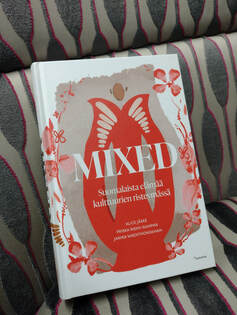
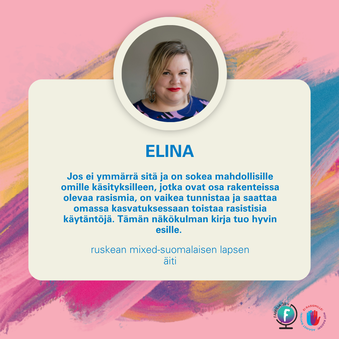
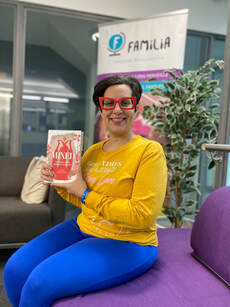
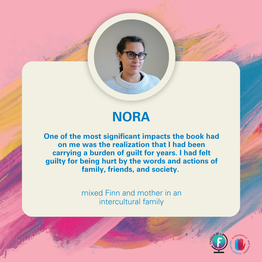
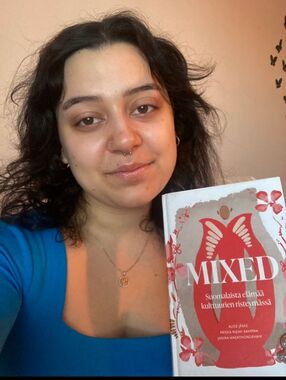
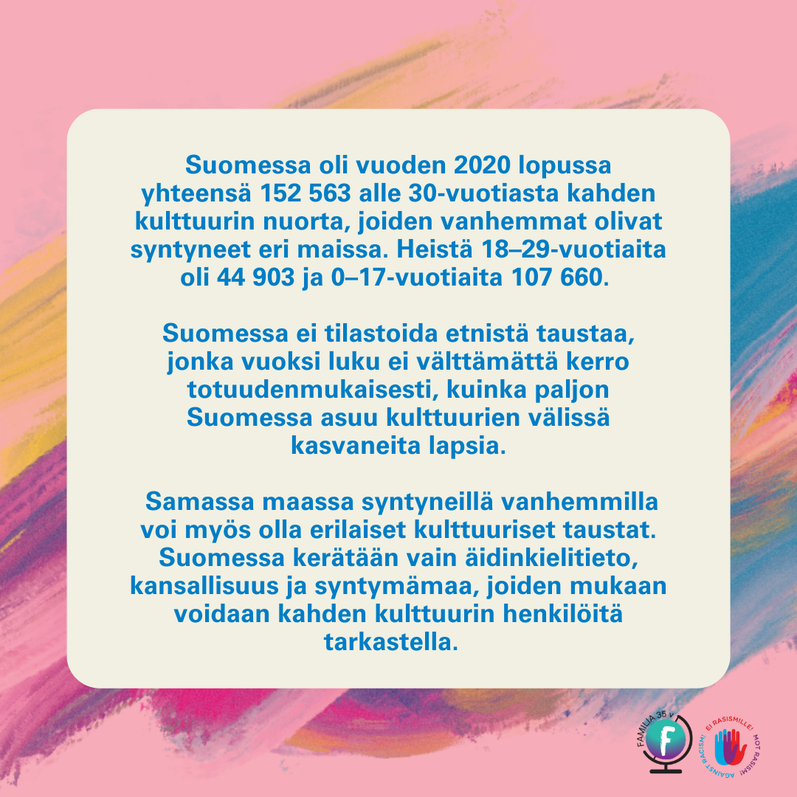
 RSS Feed
RSS Feed

